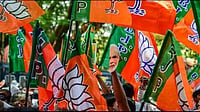Senior Congress leader Ghulam Nabi Azad has resigned from the Congress party. And his exit triggered a series of resignations within the Congress party in Jammu and Kashmir. Azad was the only known face of the Congress party in J&K. The party in Jammu and Kashmir was Azadfied. With Azad gone, the party will face a serious challenge as there is no leader in Congress of his stature in the union territory of Jammu and Kashmir.
His resignation has set off speculations all across the quiet political atmosphere of Jammu and Kashmir. The political parties, who were trying to assemble to fight against the inclusion of what they allege “25 lakh outsiders” as voters of Jammu and Kashmir, are all busy watching what would be Azad’s next move.
On August 17, Chief Electoral Officer of Jammu and Kashmir said after the abrogation of Article 370 every citizen of the country stayed ordinarily in J&K, for labour work, education and business purpose, can register as a voter in J&K and cast vote in the next assembly elections. The CEO said he expects an increase of 20 to 25 lakh voters after the completion of the special summary revision of the electoral rolls whose final announcement will be made on November 25, 2022. The announcement created a political ruckus in J&K and despite the government issuing a clarification, the parties said they weren’t satisfied with the government response, saying outside voters are akin to changing the voter demography of the region.
While the debate was going on, Azad resigned turning discourse in J&K in different directions. Many in the Valley believe Azad might face the fate of former Punjab Chief Minister Amarinder Singh. However, unlike Amarinder Singh, Azad has the backing of a large number of Congress leaders of J&K, who in the first show of loyalty towards him, resigned from the party within hours of his resignation.
Many see Azad’s new party would be dividing party as Azad has the capacity to attract a large number of leaders from different parties.
Political analyst Zafar Choudhary calls Azad’s resignation as an election alert. He says the resignation happened after the Home Minister’s meeting with NSA, LG of J&K, IB chief, and the RAW chief and it should be seen as an election alert.
“A high-level India-Pakistan back channel is working hard to arrange a bilateral meeting in September. J&K elections could be a face-saving deal for Pakistan. Centre and the BJP are not averse to elections but they can’t afford a hostile legislature, executive under any circumstances when all surveys, assessments, and analyses offer adverse results for BJP and allies but better chances for Peoples Alliance for Gupkar Declaration,” Choudhary says. “As seen from Delhi, a government led by Azad, or of which he is a potential part, is as good as BJP’s, from a strategic perspective,” Choudhary adds.
If Choudhary is believed, chances of all Kashmiri prospective Chief Ministers or others from Jammu including Ranas (Davinder Singh Rana) and Rainas (Ravinder Raina) are over. But it looks unlikely that the BJP wants to share power with anyone in Jammu and Kashmir as the party believes it can anyway sweep Jammu during the polls and can form a government with some Kashmiri party playing second fiddle.
Azad, who has substantial goodwill across the communal divide in Jammu, can wreck BJP's plans. So the question is how BJP will gain from Azad’s alleviation. Any answers?
While Azad has dispassionately spoken against the dismantling of the J&K state and turning it into two Union Territories, he has been silent on the abrogation of Article 370. He was the first J&K top politician who normalized the abrogation of Article 370 insisting that the government should restore statehood to Jammu and Kashmir. Azad has been demanding protection for jobs and land, which has resonance all across Jammu and Kashmir. Azad’s alleviation as CM or as an ally of the BJP, many here believe, will close the chapter of Article 370 but open restoration of statehood to J&K, which the BJP is not averse to.


























